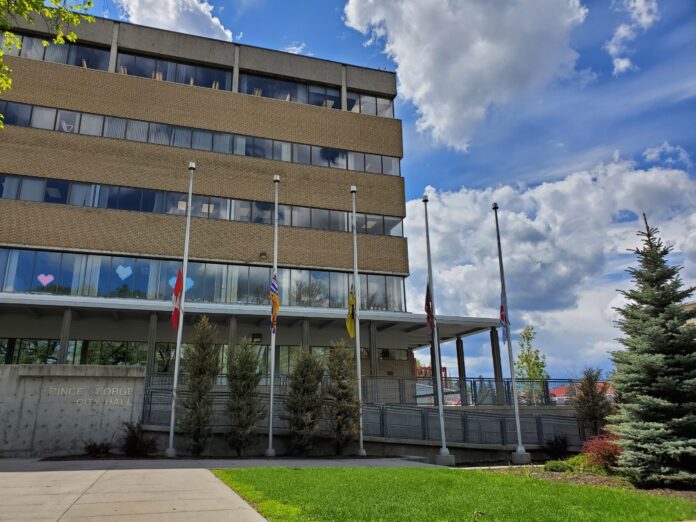The City of Prince George will be looking to spend their dollars locally after City Council passed a resolution on the City’s procurement process.
“Since the last time we met, the uncertainty of all of this really isn’t any better now than it was in March,” said Director of Finance and IT Services Kris Dalio.
“Tariffs have been threatened, they’ve been implemented, and then they’ve been postponed, and sometimes retracted.”
At last night’s (Monday) meeting, City Council was presented with a report outlining three options:
- Amend administrative procedures to put criteria around informal solicitation preference to Canadian suppliers where practicable when the purchase is below trade agreement thresholds,
- Direct Administration to obtain legal advice for establishing policy that would restrict US suppliers from bidding on formal procurement,
- Continue to operate as normal
According to the report, the New West Partnership Trade Agreement is the trade agreement with the lowest of all the trade agreement thresholds that triggers the formal procurement at the City.
The threshold is:
- $75,000 or greater for goods and services,
- $200,000 or greater for construction
“The formal procurement process is where we become exposed to that legal risk, that contract law and that procurement law,” Dalio explained
“The presence of that legal risk is essentially what’s framed the options we’ve given Council for this report.”
On the first option, Dalio said the ‘where practicable’ clause is very important.
“There’s some real showstoppers if we exclude US suppliers, and there’s some examples are listed in the report,” he explained.
On the second option, Dalio said he did not recommend the option.
“We would have to consider such things as ensuring our changes are not viewed as an attempt to influence international dispute matters that are outside of our scope,” he explained.
Dalio said they would have to be fully transparent at the start of the start of the procurement process in a legal and and defendable manner.
“We’d also have to make sure our definition of excluded suppliers is clear, easy to interpret, and resistant to those legal challenges,” he said.
He added they would have to carve out allowances for the “showstopper” items laid out in option one.
Given legal complexities as well as operational and financial impacts, Dalio recommended the third option, which was essentially to change nothing about the process.
Councillor Trudy Klassen said she was glad to see the third option recommended.
“I suggest that we just work really hard to strengthen our position against the US and whichever country would like to take us over,” she said.
“If we can build our natural resource economy, we have immense wealth to unleash, especially because we’re a supply hub, and if you know anything about the Barkerville gold rush, it was the suppliers who made the most money, so let’s be the city that does that.”
Councillor Brian Skakun referenced Kelowna’s procurement.
“They calculate that they spend, on procurement $500 million per year, and only 2.4 per cent is non-Canadian companies,” he said.
“I think Kelowna has done their homework, and I think we’re going to get ourselves probably in more trouble if we end up getting into more of a trade fight.”
Councillor Ron Polillo urged his fellow Councillors to look at the first option.
“It’s, I think, sensible, I think it’s reasonable, I think it’s low-risk, and it’s practical,” he said.
“I know staff is not recommending it, but for me, like I say, when we went down this road, we wanted to see what we can do, and we just heard from Councillor Skakun how the majority of purchases in the City of Kelowna that were not Canadian was very low, and I suspect that would be the same with us, and we haven’t gone down that road. For us, I would like us to make a statement, and I think this makes a statement.”
Councillor Kyle Sampson said he had a similar stance, looking at this as an opportunity to “take a bit of a stand.”
He also presented a motion with ‘the essence of options one and three.’
“It focuses on giving staff that leniency, but I think takes that political stance that the City of Prince George wants to prioritize, local, Prince George, regional, provincial, national, and then allied countries and beyond as necessary,” he explained.
Sampson said described it as “not formal policy,” but the stance Council has taken to help inform staff decision making.
Councillor Cori Ramsay said she had been previously approached by local businesses on the procurement practices and why businesses from outside the community were receiving the City’s business.
“Outside of the tariff concern, those issues had already been raised to me in the last couple of months,” she said.
“When we’re looking at our response to tariffs, doing things the same way we are doing them but expecting different results I don’t think is going far enough for me. I think we have to change the administrative procedure, amend it, to really take a position and make a stand to support Canadian suppliers where practicable, but also support local suppliers where practicable.”
Councillor Garth Frizzell said while he’s willing to spend more on Canadian goods, but it needs to be contrasted with taxpayer money.
“I want this to change, I want them to hear our thunder and make change and not just stand idly by, but at what expense,” he said.
“Are we going to put a lot of energy and time into something that will possibly change at mid-terms, possibly change in four years?”
A motion to go with option three was eventually defeated, with Frizzell, Skakun and Klassen voting in favour.
With some minor adjustments, Sampson’s motion on option one was carried unanimously.
Something going on in the Prince George area you think people should know about?
Send us a news tip by emailing [email protected].







